Trauma Informed Care: Impact on Mental Healthcare, Principles
VerifiedAdded on 2020/02/24
|11
|2180
|224
Essay
AI Summary
This essay provides a comprehensive overview of trauma informed care (TIC), a treatment framework designed to help physicians address the effects of trauma on patients with mental health issues. The paper begins by defining TIC and highlighting its significance in improving mental healthcare strategies. It then delves into the disease background, explaining how TIC helps physicians recognize and respond to trauma-related issues, including understanding diverse emotions and disorders. The essay emphasizes the importance of recognizing trauma signs and symptoms and integrating this knowledge into policies and procedures. Furthermore, it explores the six key principles guiding TIC: safety, transparency and trustworthiness, peer support, collaboration and mutuality, empowerment, and cultural sensitivity. The essay concludes by summarizing the main findings, emphasizing the effectiveness of TIC in enhancing treatment strategies and improving patient outcomes. It highlights the significance of adhering to the principles of TIC to ensure its effectiveness in patient care and emphasizes its importance in helping individuals recover from mental health issues and live normal lives. The paper references several studies and publications to support its claims.
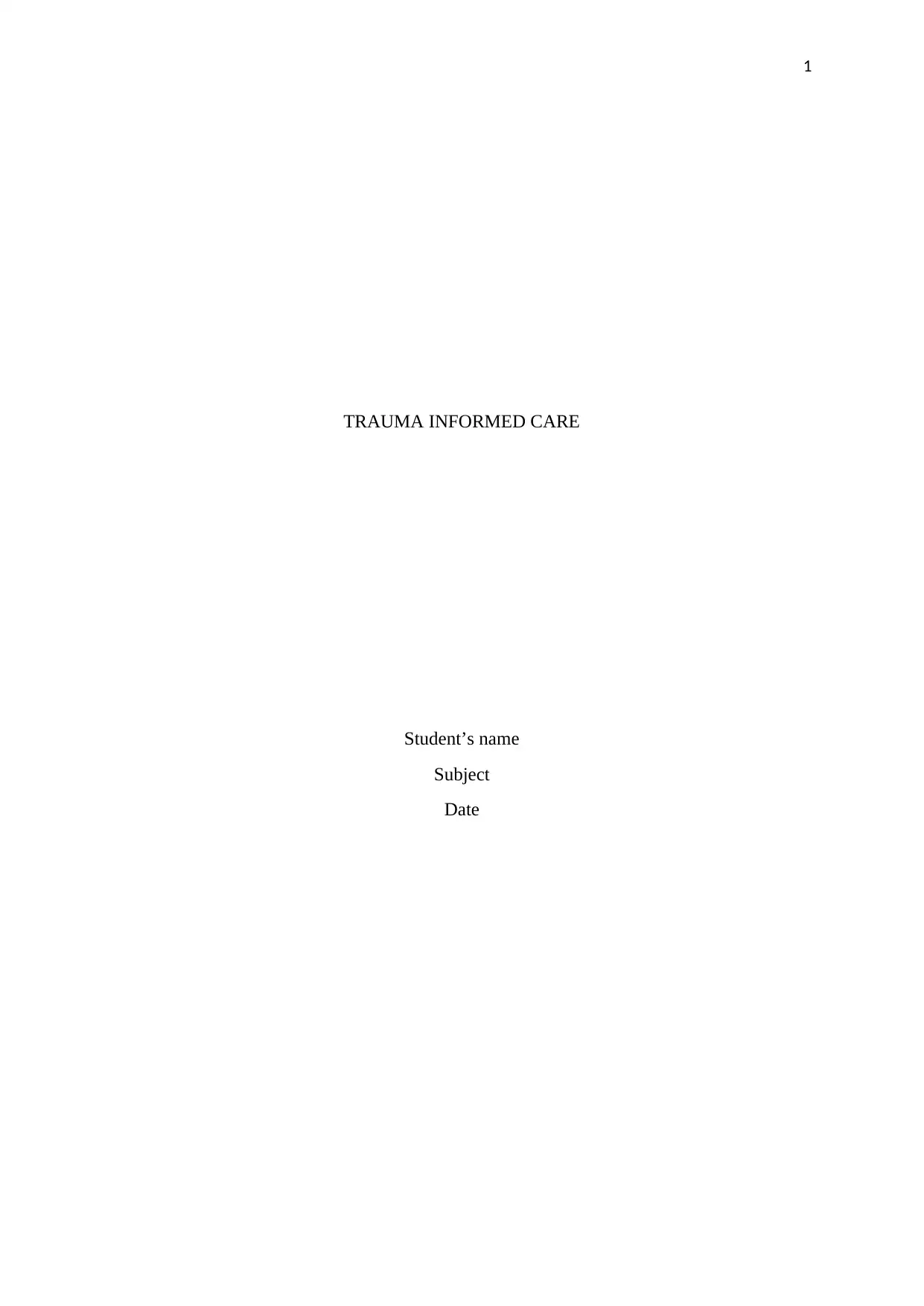
1
TRAUMA INFORMED CARE
Student’s name
Subject
Date
TRAUMA INFORMED CARE
Student’s name
Subject
Date
Paraphrase This Document
Need a fresh take? Get an instant paraphrase of this document with our AI Paraphraser
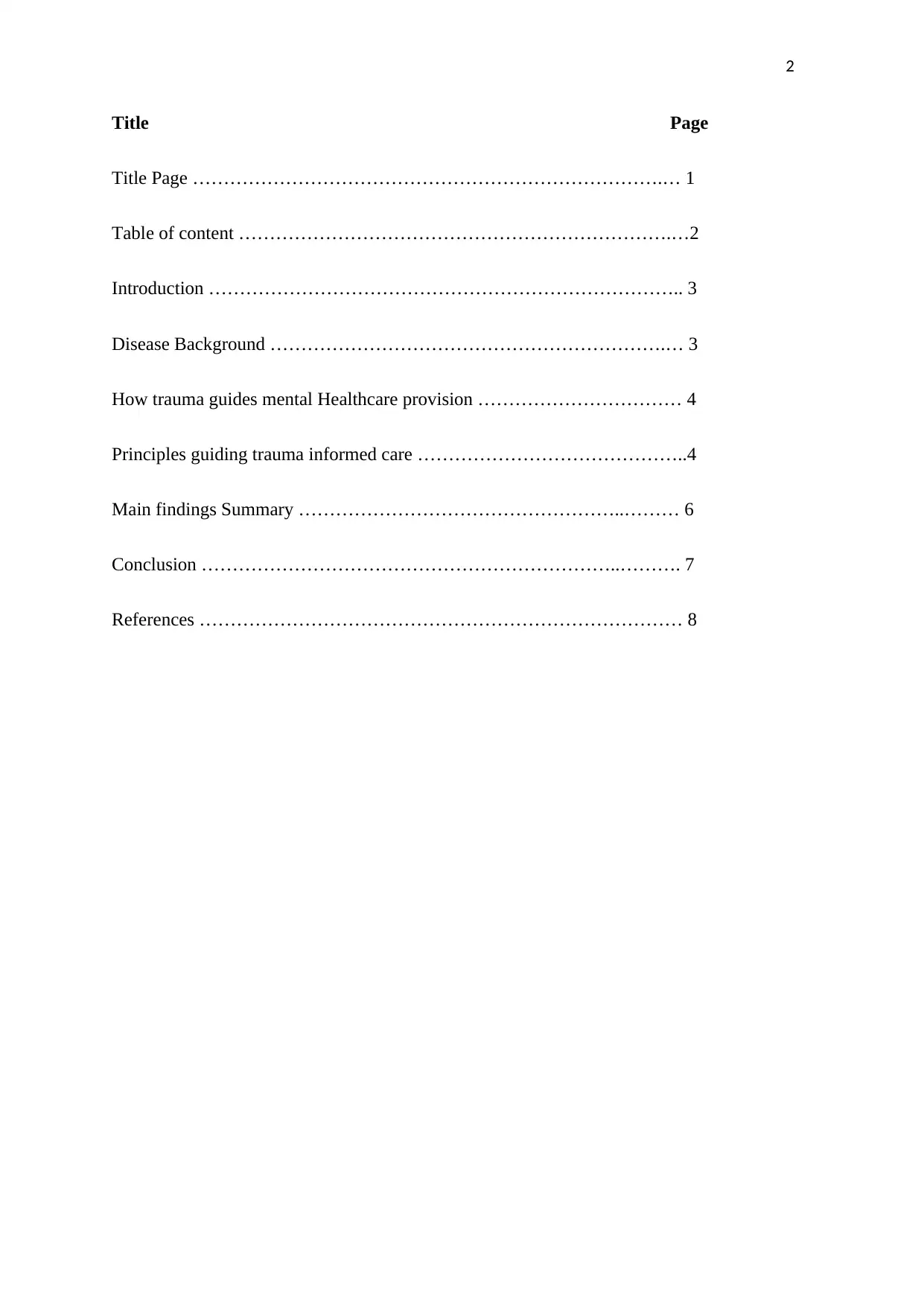
2
Title Page
Title Page ………………………………………………………………….… 1
Table of content …………………………………………………………….…2
Introduction ………………………………………………………………….. 3
Disease Background ……………………………………………………….… 3
How trauma guides mental Healthcare provision …………………………… 4
Principles guiding trauma informed care ……………………………………..4
Main findings Summary ……………………………………………..……… 6
Conclusion …………………………………………………………..………. 7
References …………………………………………………………………… 8
Title Page
Title Page ………………………………………………………………….… 1
Table of content …………………………………………………………….…2
Introduction ………………………………………………………………….. 3
Disease Background ……………………………………………………….… 3
How trauma guides mental Healthcare provision …………………………… 4
Principles guiding trauma informed care ……………………………………..4
Main findings Summary ……………………………………………..……… 6
Conclusion …………………………………………………………..………. 7
References …………………………………………………………………… 8
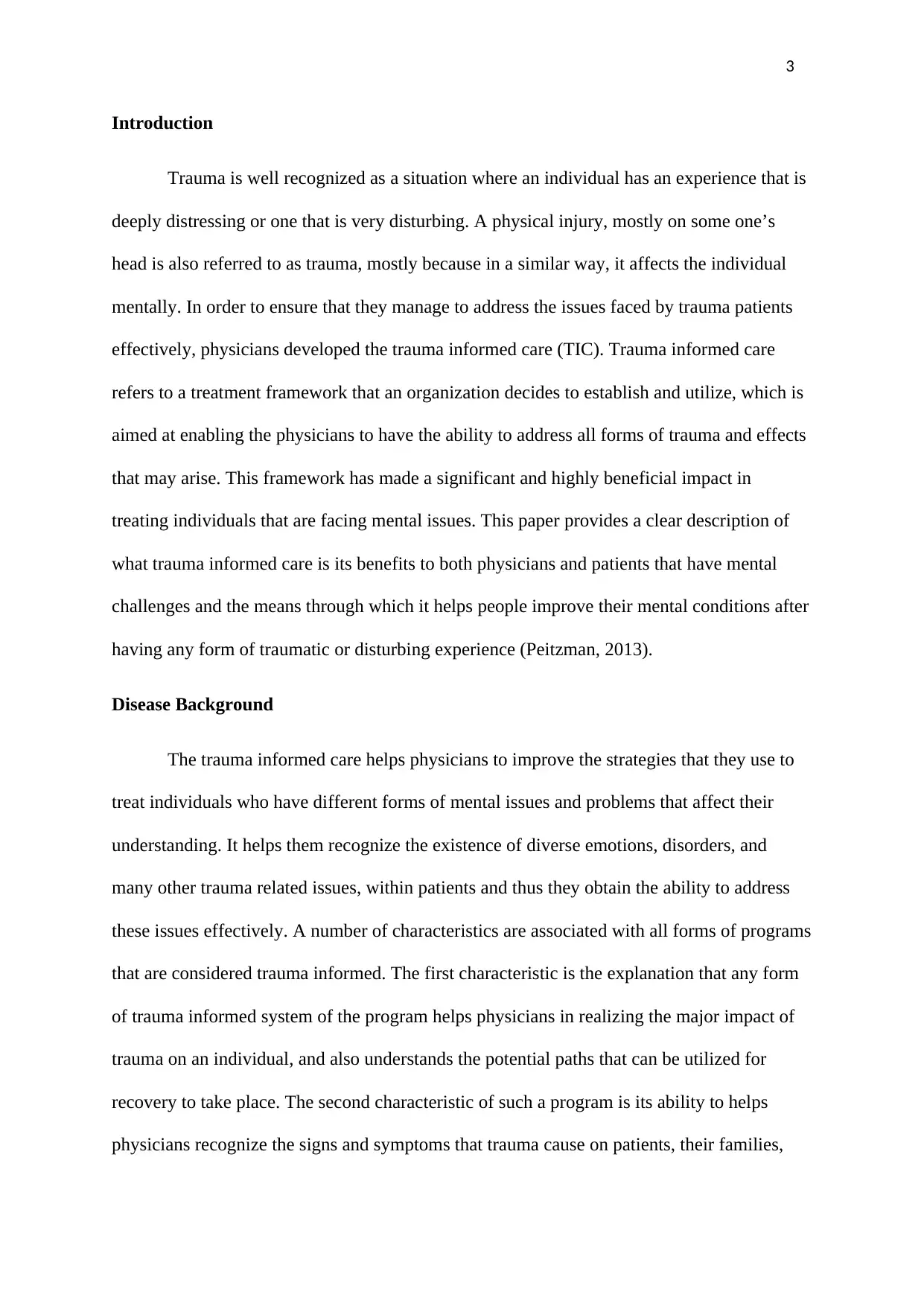
3
Introduction
Trauma is well recognized as a situation where an individual has an experience that is
deeply distressing or one that is very disturbing. A physical injury, mostly on some one’s
head is also referred to as trauma, mostly because in a similar way, it affects the individual
mentally. In order to ensure that they manage to address the issues faced by trauma patients
effectively, physicians developed the trauma informed care (TIC). Trauma informed care
refers to a treatment framework that an organization decides to establish and utilize, which is
aimed at enabling the physicians to have the ability to address all forms of trauma and effects
that may arise. This framework has made a significant and highly beneficial impact in
treating individuals that are facing mental issues. This paper provides a clear description of
what trauma informed care is its benefits to both physicians and patients that have mental
challenges and the means through which it helps people improve their mental conditions after
having any form of traumatic or disturbing experience (Peitzman, 2013).
Disease Background
The trauma informed care helps physicians to improve the strategies that they use to
treat individuals who have different forms of mental issues and problems that affect their
understanding. It helps them recognize the existence of diverse emotions, disorders, and
many other trauma related issues, within patients and thus they obtain the ability to address
these issues effectively. A number of characteristics are associated with all forms of programs
that are considered trauma informed. The first characteristic is the explanation that any form
of trauma informed system of the program helps physicians in realizing the major impact of
trauma on an individual, and also understands the potential paths that can be utilized for
recovery to take place. The second characteristic of such a program is its ability to helps
physicians recognize the signs and symptoms that trauma cause on patients, their families,
Introduction
Trauma is well recognized as a situation where an individual has an experience that is
deeply distressing or one that is very disturbing. A physical injury, mostly on some one’s
head is also referred to as trauma, mostly because in a similar way, it affects the individual
mentally. In order to ensure that they manage to address the issues faced by trauma patients
effectively, physicians developed the trauma informed care (TIC). Trauma informed care
refers to a treatment framework that an organization decides to establish and utilize, which is
aimed at enabling the physicians to have the ability to address all forms of trauma and effects
that may arise. This framework has made a significant and highly beneficial impact in
treating individuals that are facing mental issues. This paper provides a clear description of
what trauma informed care is its benefits to both physicians and patients that have mental
challenges and the means through which it helps people improve their mental conditions after
having any form of traumatic or disturbing experience (Peitzman, 2013).
Disease Background
The trauma informed care helps physicians to improve the strategies that they use to
treat individuals who have different forms of mental issues and problems that affect their
understanding. It helps them recognize the existence of diverse emotions, disorders, and
many other trauma related issues, within patients and thus they obtain the ability to address
these issues effectively. A number of characteristics are associated with all forms of programs
that are considered trauma informed. The first characteristic is the explanation that any form
of trauma informed system of the program helps physicians in realizing the major impact of
trauma on an individual, and also understands the potential paths that can be utilized for
recovery to take place. The second characteristic of such a program is its ability to helps
physicians recognize the signs and symptoms that trauma cause on patients, their families,
⊘ This is a preview!⊘
Do you want full access?
Subscribe today to unlock all pages.

Trusted by 1+ million students worldwide
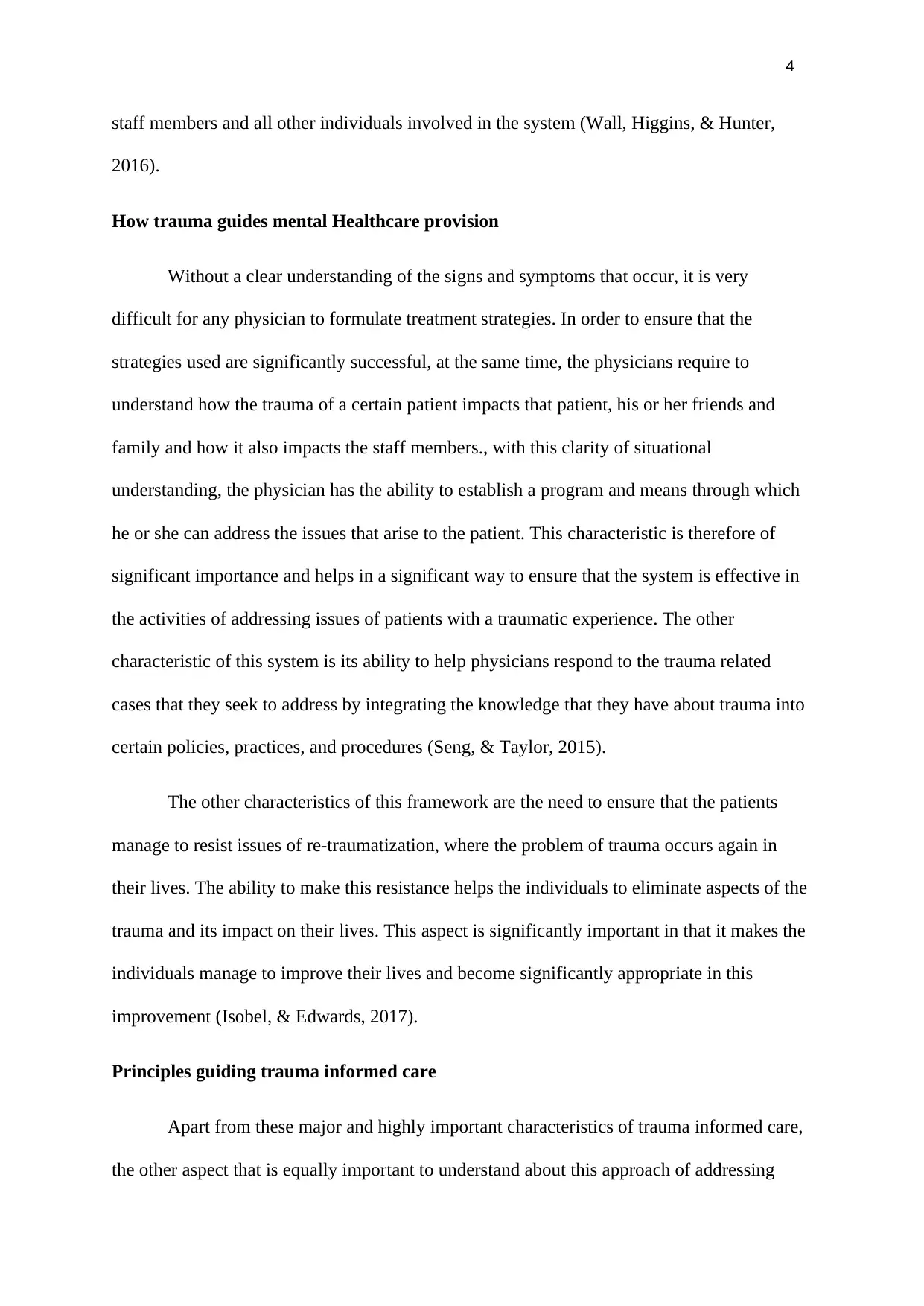
4
staff members and all other individuals involved in the system (Wall, Higgins, & Hunter,
2016).
How trauma guides mental Healthcare provision
Without a clear understanding of the signs and symptoms that occur, it is very
difficult for any physician to formulate treatment strategies. In order to ensure that the
strategies used are significantly successful, at the same time, the physicians require to
understand how the trauma of a certain patient impacts that patient, his or her friends and
family and how it also impacts the staff members., with this clarity of situational
understanding, the physician has the ability to establish a program and means through which
he or she can address the issues that arise to the patient. This characteristic is therefore of
significant importance and helps in a significant way to ensure that the system is effective in
the activities of addressing issues of patients with a traumatic experience. The other
characteristic of this system is its ability to help physicians respond to the trauma related
cases that they seek to address by integrating the knowledge that they have about trauma into
certain policies, practices, and procedures (Seng, & Taylor, 2015).
The other characteristics of this framework are the need to ensure that the patients
manage to resist issues of re-traumatization, where the problem of trauma occurs again in
their lives. The ability to make this resistance helps the individuals to eliminate aspects of the
trauma and its impact on their lives. This aspect is significantly important in that it makes the
individuals manage to improve their lives and become significantly appropriate in this
improvement (Isobel, & Edwards, 2017).
Principles guiding trauma informed care
Apart from these major and highly important characteristics of trauma informed care,
the other aspect that is equally important to understand about this approach of addressing
staff members and all other individuals involved in the system (Wall, Higgins, & Hunter,
2016).
How trauma guides mental Healthcare provision
Without a clear understanding of the signs and symptoms that occur, it is very
difficult for any physician to formulate treatment strategies. In order to ensure that the
strategies used are significantly successful, at the same time, the physicians require to
understand how the trauma of a certain patient impacts that patient, his or her friends and
family and how it also impacts the staff members., with this clarity of situational
understanding, the physician has the ability to establish a program and means through which
he or she can address the issues that arise to the patient. This characteristic is therefore of
significant importance and helps in a significant way to ensure that the system is effective in
the activities of addressing issues of patients with a traumatic experience. The other
characteristic of this system is its ability to help physicians respond to the trauma related
cases that they seek to address by integrating the knowledge that they have about trauma into
certain policies, practices, and procedures (Seng, & Taylor, 2015).
The other characteristics of this framework are the need to ensure that the patients
manage to resist issues of re-traumatization, where the problem of trauma occurs again in
their lives. The ability to make this resistance helps the individuals to eliminate aspects of the
trauma and its impact on their lives. This aspect is significantly important in that it makes the
individuals manage to improve their lives and become significantly appropriate in this
improvement (Isobel, & Edwards, 2017).
Principles guiding trauma informed care
Apart from these major and highly important characteristics of trauma informed care,
the other aspect that is equally important to understand about this approach of addressing
Paraphrase This Document
Need a fresh take? Get an instant paraphrase of this document with our AI Paraphraser
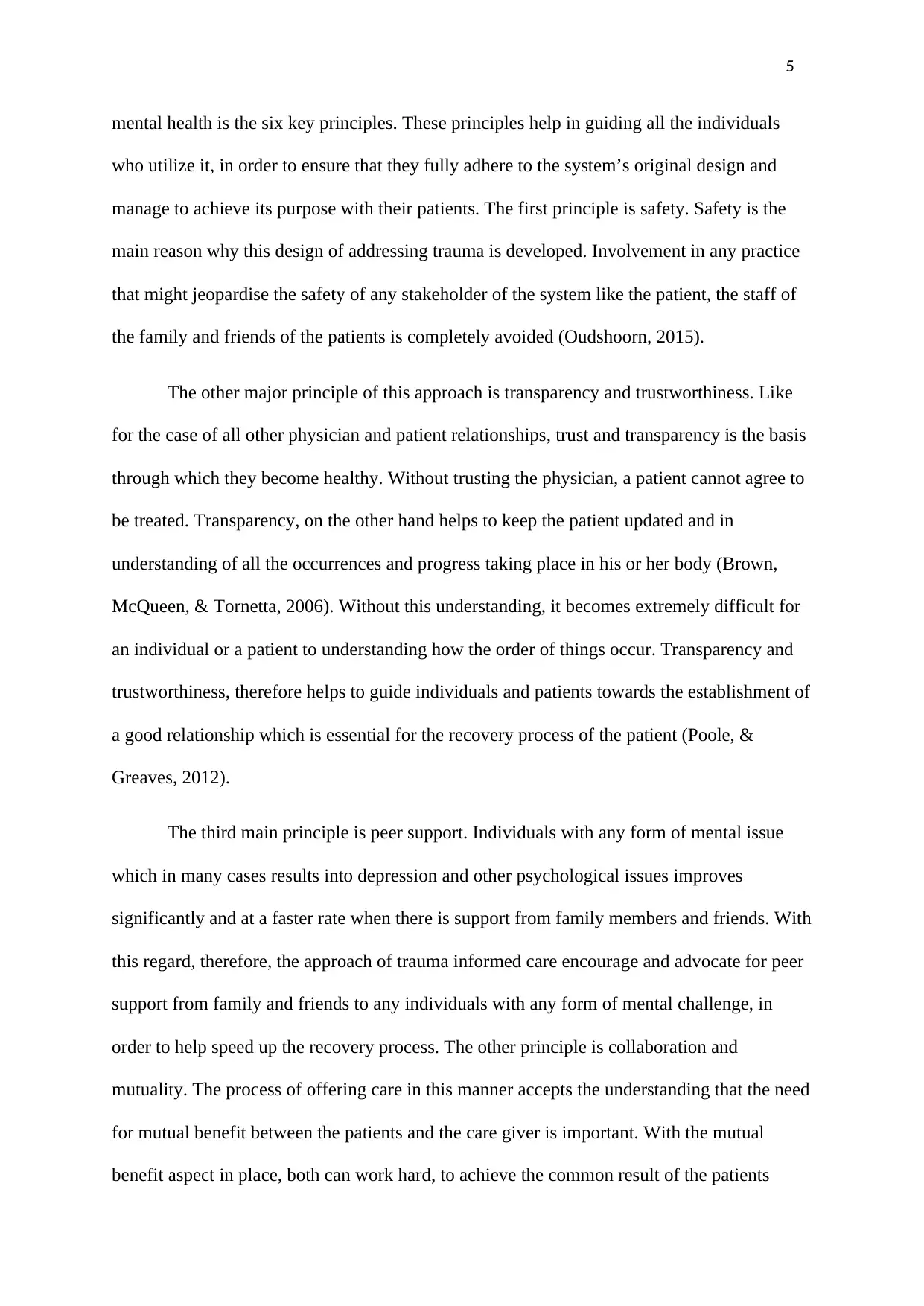
5
mental health is the six key principles. These principles help in guiding all the individuals
who utilize it, in order to ensure that they fully adhere to the system’s original design and
manage to achieve its purpose with their patients. The first principle is safety. Safety is the
main reason why this design of addressing trauma is developed. Involvement in any practice
that might jeopardise the safety of any stakeholder of the system like the patient, the staff of
the family and friends of the patients is completely avoided (Oudshoorn, 2015).
The other major principle of this approach is transparency and trustworthiness. Like
for the case of all other physician and patient relationships, trust and transparency is the basis
through which they become healthy. Without trusting the physician, a patient cannot agree to
be treated. Transparency, on the other hand helps to keep the patient updated and in
understanding of all the occurrences and progress taking place in his or her body (Brown,
McQueen, & Tornetta, 2006). Without this understanding, it becomes extremely difficult for
an individual or a patient to understanding how the order of things occur. Transparency and
trustworthiness, therefore helps to guide individuals and patients towards the establishment of
a good relationship which is essential for the recovery process of the patient (Poole, &
Greaves, 2012).
The third main principle is peer support. Individuals with any form of mental issue
which in many cases results into depression and other psychological issues improves
significantly and at a faster rate when there is support from family members and friends. With
this regard, therefore, the approach of trauma informed care encourage and advocate for peer
support from family and friends to any individuals with any form of mental challenge, in
order to help speed up the recovery process. The other principle is collaboration and
mutuality. The process of offering care in this manner accepts the understanding that the need
for mutual benefit between the patients and the care giver is important. With the mutual
benefit aspect in place, both can work hard, to achieve the common result of the patients
mental health is the six key principles. These principles help in guiding all the individuals
who utilize it, in order to ensure that they fully adhere to the system’s original design and
manage to achieve its purpose with their patients. The first principle is safety. Safety is the
main reason why this design of addressing trauma is developed. Involvement in any practice
that might jeopardise the safety of any stakeholder of the system like the patient, the staff of
the family and friends of the patients is completely avoided (Oudshoorn, 2015).
The other major principle of this approach is transparency and trustworthiness. Like
for the case of all other physician and patient relationships, trust and transparency is the basis
through which they become healthy. Without trusting the physician, a patient cannot agree to
be treated. Transparency, on the other hand helps to keep the patient updated and in
understanding of all the occurrences and progress taking place in his or her body (Brown,
McQueen, & Tornetta, 2006). Without this understanding, it becomes extremely difficult for
an individual or a patient to understanding how the order of things occur. Transparency and
trustworthiness, therefore helps to guide individuals and patients towards the establishment of
a good relationship which is essential for the recovery process of the patient (Poole, &
Greaves, 2012).
The third main principle is peer support. Individuals with any form of mental issue
which in many cases results into depression and other psychological issues improves
significantly and at a faster rate when there is support from family members and friends. With
this regard, therefore, the approach of trauma informed care encourage and advocate for peer
support from family and friends to any individuals with any form of mental challenge, in
order to help speed up the recovery process. The other principle is collaboration and
mutuality. The process of offering care in this manner accepts the understanding that the need
for mutual benefit between the patients and the care giver is important. With the mutual
benefit aspect in place, both can work hard, to achieve the common result of the patients
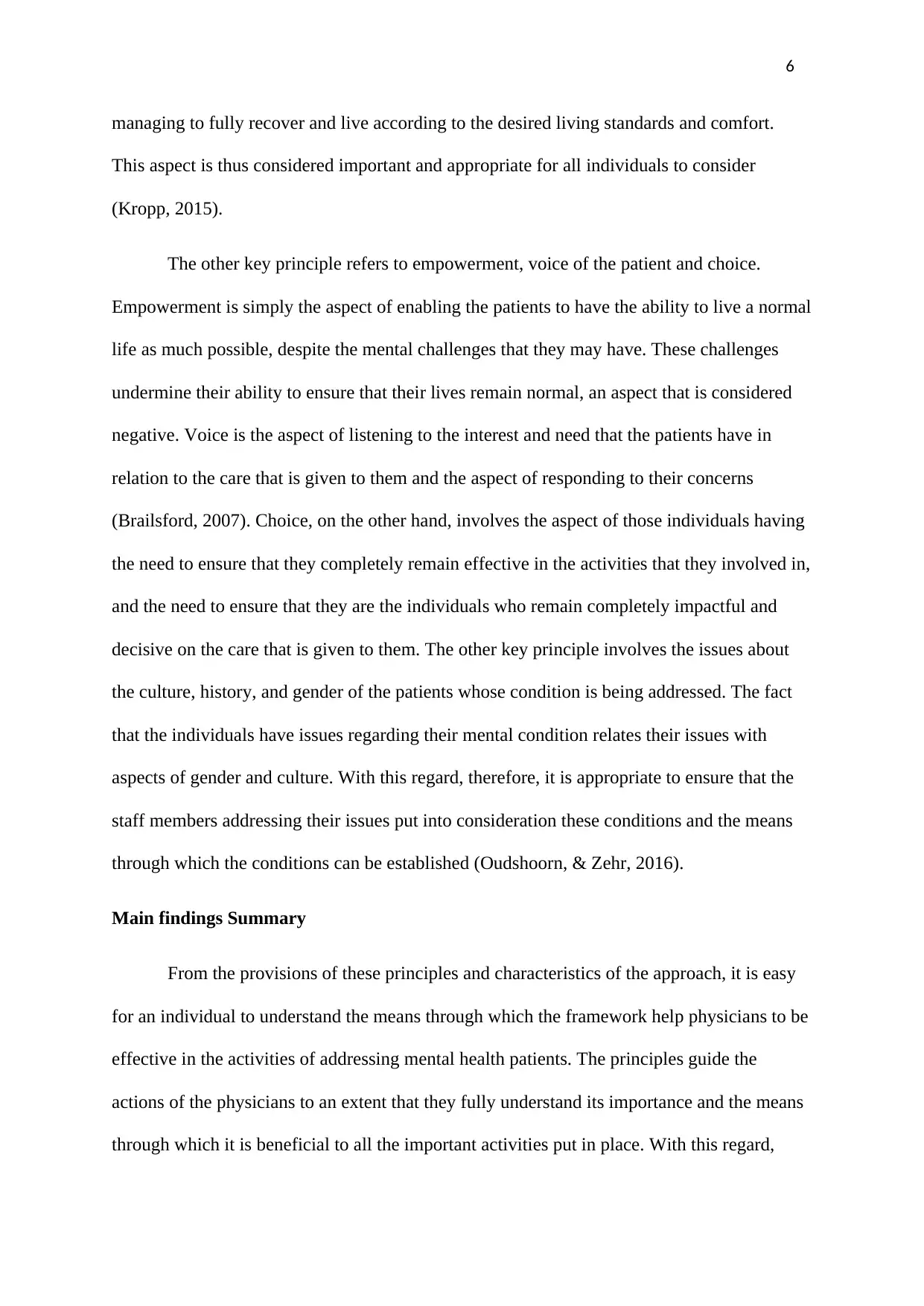
6
managing to fully recover and live according to the desired living standards and comfort.
This aspect is thus considered important and appropriate for all individuals to consider
(Kropp, 2015).
The other key principle refers to empowerment, voice of the patient and choice.
Empowerment is simply the aspect of enabling the patients to have the ability to live a normal
life as much possible, despite the mental challenges that they may have. These challenges
undermine their ability to ensure that their lives remain normal, an aspect that is considered
negative. Voice is the aspect of listening to the interest and need that the patients have in
relation to the care that is given to them and the aspect of responding to their concerns
(Brailsford, 2007). Choice, on the other hand, involves the aspect of those individuals having
the need to ensure that they completely remain effective in the activities that they involved in,
and the need to ensure that they are the individuals who remain completely impactful and
decisive on the care that is given to them. The other key principle involves the issues about
the culture, history, and gender of the patients whose condition is being addressed. The fact
that the individuals have issues regarding their mental condition relates their issues with
aspects of gender and culture. With this regard, therefore, it is appropriate to ensure that the
staff members addressing their issues put into consideration these conditions and the means
through which the conditions can be established (Oudshoorn, & Zehr, 2016).
Main findings Summary
From the provisions of these principles and characteristics of the approach, it is easy
for an individual to understand the means through which the framework help physicians to be
effective in the activities of addressing mental health patients. The principles guide the
actions of the physicians to an extent that they fully understand its importance and the means
through which it is beneficial to all the important activities put in place. With this regard,
managing to fully recover and live according to the desired living standards and comfort.
This aspect is thus considered important and appropriate for all individuals to consider
(Kropp, 2015).
The other key principle refers to empowerment, voice of the patient and choice.
Empowerment is simply the aspect of enabling the patients to have the ability to live a normal
life as much possible, despite the mental challenges that they may have. These challenges
undermine their ability to ensure that their lives remain normal, an aspect that is considered
negative. Voice is the aspect of listening to the interest and need that the patients have in
relation to the care that is given to them and the aspect of responding to their concerns
(Brailsford, 2007). Choice, on the other hand, involves the aspect of those individuals having
the need to ensure that they completely remain effective in the activities that they involved in,
and the need to ensure that they are the individuals who remain completely impactful and
decisive on the care that is given to them. The other key principle involves the issues about
the culture, history, and gender of the patients whose condition is being addressed. The fact
that the individuals have issues regarding their mental condition relates their issues with
aspects of gender and culture. With this regard, therefore, it is appropriate to ensure that the
staff members addressing their issues put into consideration these conditions and the means
through which the conditions can be established (Oudshoorn, & Zehr, 2016).
Main findings Summary
From the provisions of these principles and characteristics of the approach, it is easy
for an individual to understand the means through which the framework help physicians to be
effective in the activities of addressing mental health patients. The principles guide the
actions of the physicians to an extent that they fully understand its importance and the means
through which it is beneficial to all the important activities put in place. With this regard,
⊘ This is a preview!⊘
Do you want full access?
Subscribe today to unlock all pages.

Trusted by 1+ million students worldwide
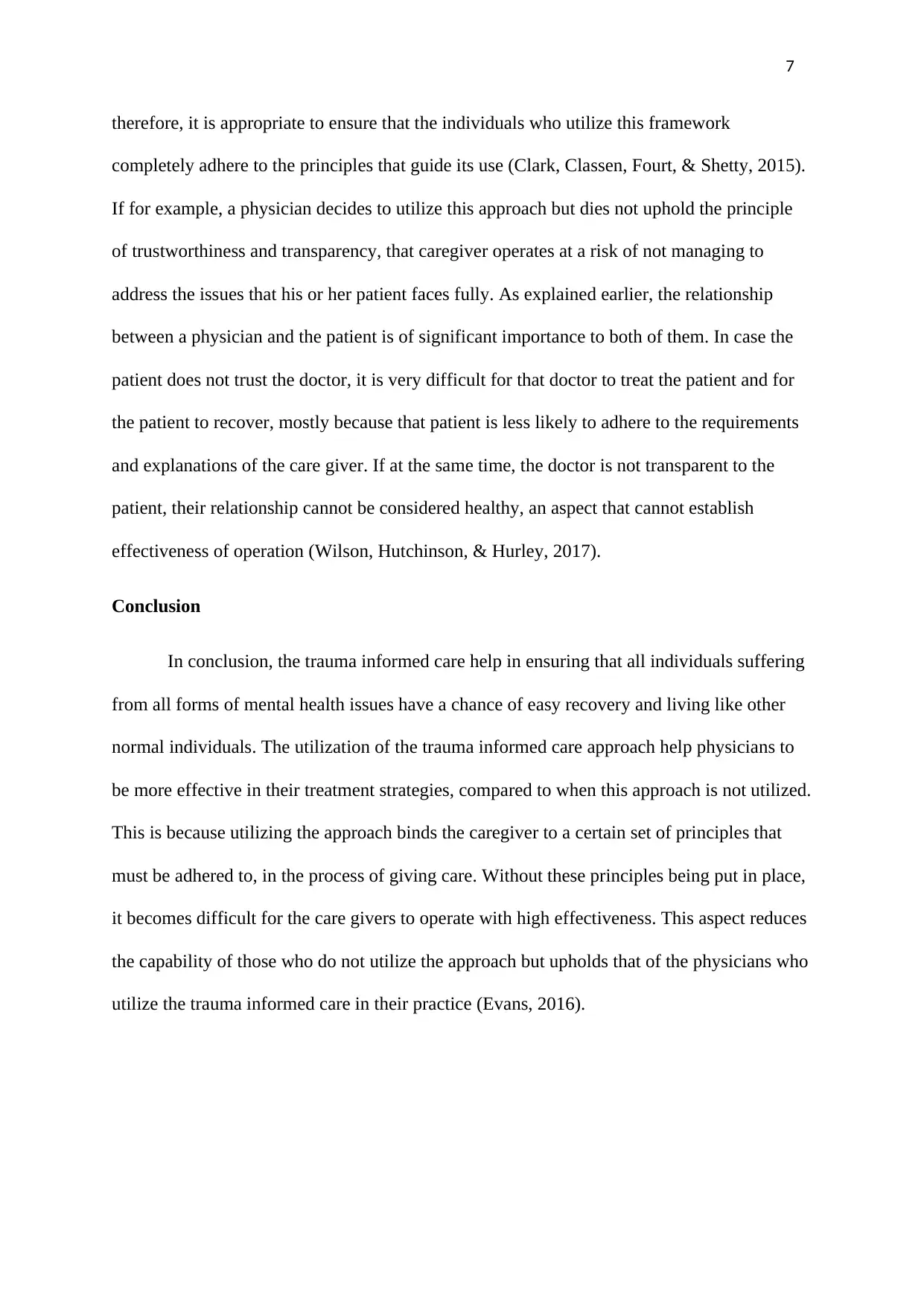
7
therefore, it is appropriate to ensure that the individuals who utilize this framework
completely adhere to the principles that guide its use (Clark, Classen, Fourt, & Shetty, 2015).
If for example, a physician decides to utilize this approach but dies not uphold the principle
of trustworthiness and transparency, that caregiver operates at a risk of not managing to
address the issues that his or her patient faces fully. As explained earlier, the relationship
between a physician and the patient is of significant importance to both of them. In case the
patient does not trust the doctor, it is very difficult for that doctor to treat the patient and for
the patient to recover, mostly because that patient is less likely to adhere to the requirements
and explanations of the care giver. If at the same time, the doctor is not transparent to the
patient, their relationship cannot be considered healthy, an aspect that cannot establish
effectiveness of operation (Wilson, Hutchinson, & Hurley, 2017).
Conclusion
In conclusion, the trauma informed care help in ensuring that all individuals suffering
from all forms of mental health issues have a chance of easy recovery and living like other
normal individuals. The utilization of the trauma informed care approach help physicians to
be more effective in their treatment strategies, compared to when this approach is not utilized.
This is because utilizing the approach binds the caregiver to a certain set of principles that
must be adhered to, in the process of giving care. Without these principles being put in place,
it becomes difficult for the care givers to operate with high effectiveness. This aspect reduces
the capability of those who do not utilize the approach but upholds that of the physicians who
utilize the trauma informed care in their practice (Evans, 2016).
therefore, it is appropriate to ensure that the individuals who utilize this framework
completely adhere to the principles that guide its use (Clark, Classen, Fourt, & Shetty, 2015).
If for example, a physician decides to utilize this approach but dies not uphold the principle
of trustworthiness and transparency, that caregiver operates at a risk of not managing to
address the issues that his or her patient faces fully. As explained earlier, the relationship
between a physician and the patient is of significant importance to both of them. In case the
patient does not trust the doctor, it is very difficult for that doctor to treat the patient and for
the patient to recover, mostly because that patient is less likely to adhere to the requirements
and explanations of the care giver. If at the same time, the doctor is not transparent to the
patient, their relationship cannot be considered healthy, an aspect that cannot establish
effectiveness of operation (Wilson, Hutchinson, & Hurley, 2017).
Conclusion
In conclusion, the trauma informed care help in ensuring that all individuals suffering
from all forms of mental health issues have a chance of easy recovery and living like other
normal individuals. The utilization of the trauma informed care approach help physicians to
be more effective in their treatment strategies, compared to when this approach is not utilized.
This is because utilizing the approach binds the caregiver to a certain set of principles that
must be adhered to, in the process of giving care. Without these principles being put in place,
it becomes difficult for the care givers to operate with high effectiveness. This aspect reduces
the capability of those who do not utilize the approach but upholds that of the physicians who
utilize the trauma informed care in their practice (Evans, 2016).
Paraphrase This Document
Need a fresh take? Get an instant paraphrase of this document with our AI Paraphraser
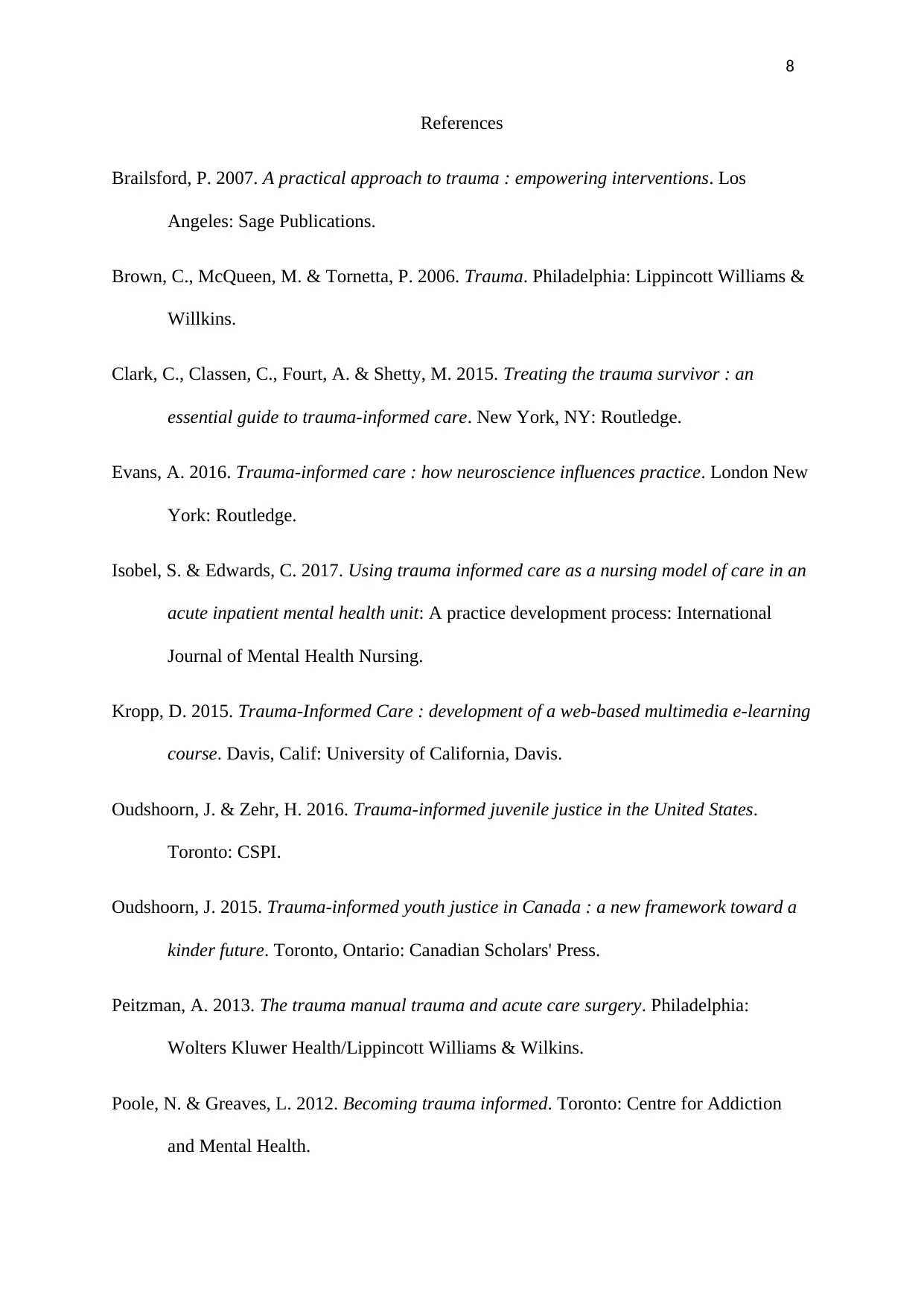
8
References
Brailsford, P. 2007. A practical approach to trauma : empowering interventions. Los
Angeles: Sage Publications.
Brown, C., McQueen, M. & Tornetta, P. 2006. Trauma. Philadelphia: Lippincott Williams &
Willkins.
Clark, C., Classen, C., Fourt, A. & Shetty, M. 2015. Treating the trauma survivor : an
essential guide to trauma-informed care. New York, NY: Routledge.
Evans, A. 2016. Trauma-informed care : how neuroscience influences practice. London New
York: Routledge.
Isobel, S. & Edwards, C. 2017. Using trauma informed care as a nursing model of care in an
acute inpatient mental health unit: A practice development process: International
Journal of Mental Health Nursing.
Kropp, D. 2015. Trauma-Informed Care : development of a web-based multimedia e-learning
course. Davis, Calif: University of California, Davis.
Oudshoorn, J. & Zehr, H. 2016. Trauma-informed juvenile justice in the United States.
Toronto: CSPI.
Oudshoorn, J. 2015. Trauma-informed youth justice in Canada : a new framework toward a
kinder future. Toronto, Ontario: Canadian Scholars' Press.
Peitzman, A. 2013. The trauma manual trauma and acute care surgery. Philadelphia:
Wolters Kluwer Health/Lippincott Williams & Wilkins.
Poole, N. & Greaves, L. 2012. Becoming trauma informed. Toronto: Centre for Addiction
and Mental Health.
References
Brailsford, P. 2007. A practical approach to trauma : empowering interventions. Los
Angeles: Sage Publications.
Brown, C., McQueen, M. & Tornetta, P. 2006. Trauma. Philadelphia: Lippincott Williams &
Willkins.
Clark, C., Classen, C., Fourt, A. & Shetty, M. 2015. Treating the trauma survivor : an
essential guide to trauma-informed care. New York, NY: Routledge.
Evans, A. 2016. Trauma-informed care : how neuroscience influences practice. London New
York: Routledge.
Isobel, S. & Edwards, C. 2017. Using trauma informed care as a nursing model of care in an
acute inpatient mental health unit: A practice development process: International
Journal of Mental Health Nursing.
Kropp, D. 2015. Trauma-Informed Care : development of a web-based multimedia e-learning
course. Davis, Calif: University of California, Davis.
Oudshoorn, J. & Zehr, H. 2016. Trauma-informed juvenile justice in the United States.
Toronto: CSPI.
Oudshoorn, J. 2015. Trauma-informed youth justice in Canada : a new framework toward a
kinder future. Toronto, Ontario: Canadian Scholars' Press.
Peitzman, A. 2013. The trauma manual trauma and acute care surgery. Philadelphia:
Wolters Kluwer Health/Lippincott Williams & Wilkins.
Poole, N. & Greaves, L. 2012. Becoming trauma informed. Toronto: Centre for Addiction
and Mental Health.
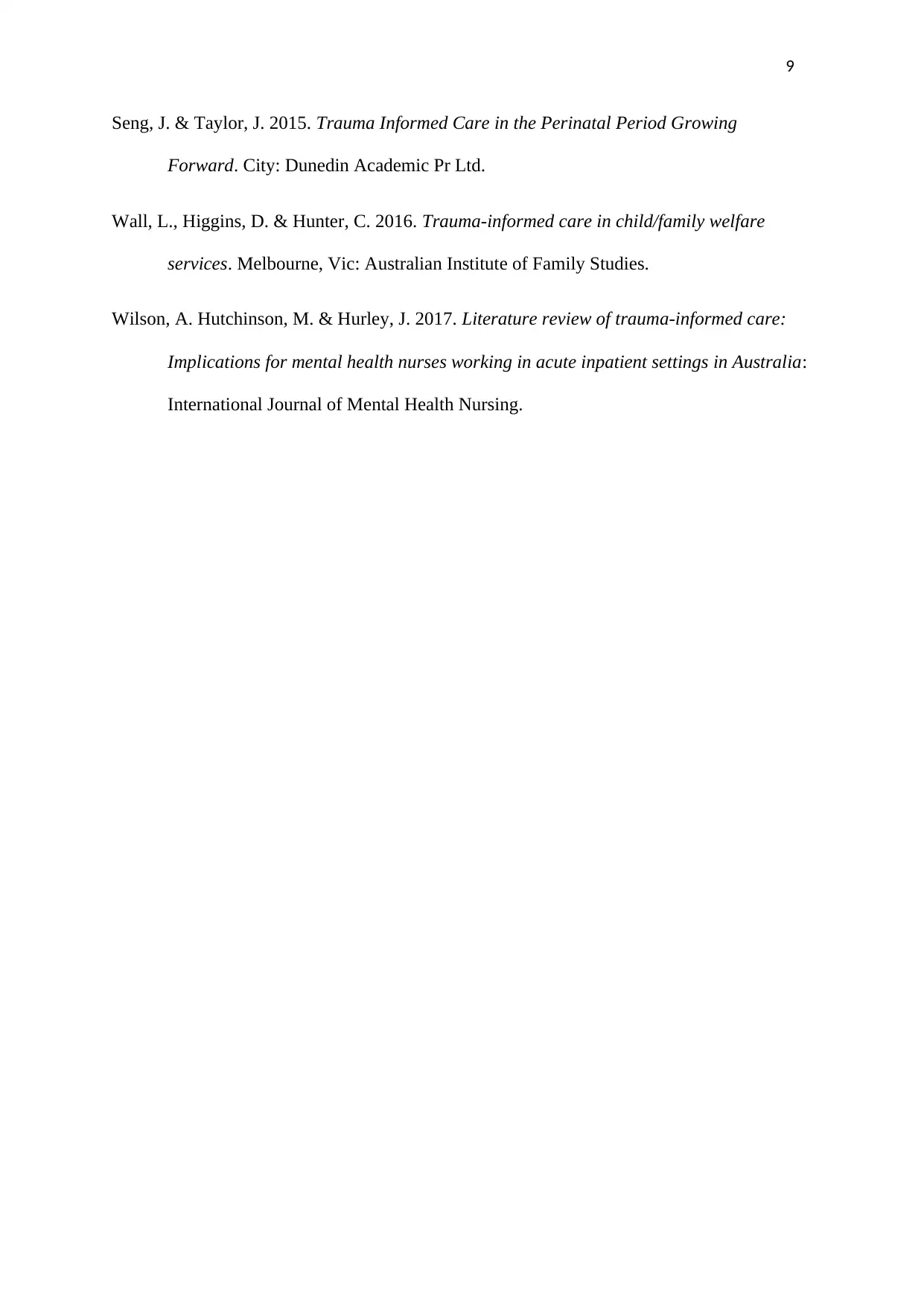
9
Seng, J. & Taylor, J. 2015. Trauma Informed Care in the Perinatal Period Growing
Forward. City: Dunedin Academic Pr Ltd.
Wall, L., Higgins, D. & Hunter, C. 2016. Trauma-informed care in child/family welfare
services. Melbourne, Vic: Australian Institute of Family Studies.
Wilson, A. Hutchinson, M. & Hurley, J. 2017. Literature review of trauma-informed care:
Implications for mental health nurses working in acute inpatient settings in Australia:
International Journal of Mental Health Nursing.
Seng, J. & Taylor, J. 2015. Trauma Informed Care in the Perinatal Period Growing
Forward. City: Dunedin Academic Pr Ltd.
Wall, L., Higgins, D. & Hunter, C. 2016. Trauma-informed care in child/family welfare
services. Melbourne, Vic: Australian Institute of Family Studies.
Wilson, A. Hutchinson, M. & Hurley, J. 2017. Literature review of trauma-informed care:
Implications for mental health nurses working in acute inpatient settings in Australia:
International Journal of Mental Health Nursing.
⊘ This is a preview!⊘
Do you want full access?
Subscribe today to unlock all pages.

Trusted by 1+ million students worldwide

10
Paraphrase This Document
Need a fresh take? Get an instant paraphrase of this document with our AI Paraphraser

11
1 out of 11
Related Documents
Your All-in-One AI-Powered Toolkit for Academic Success.
+13062052269
info@desklib.com
Available 24*7 on WhatsApp / Email
![[object Object]](/_next/static/media/star-bottom.7253800d.svg)
Unlock your academic potential
Copyright © 2020–2025 A2Z Services. All Rights Reserved. Developed and managed by ZUCOL.





